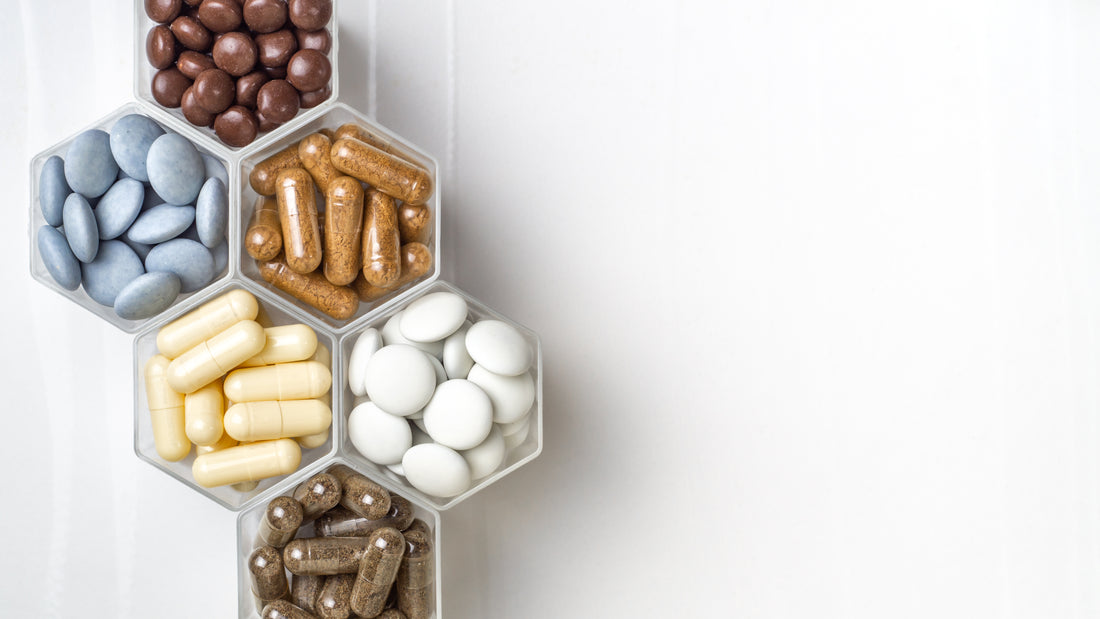THREE REASONS WHY YOU AREN’T GETTING RESULTS FROM SUPPLEMENTS AND WHAT TO TRY INSTEAD


Nearly every week, an attention-grabbing news story emerges, revealing a dark side of the health and wellness industry. Articles in prominent consumer-facing publications have called into doubt the health benefits of superfood powders, while scientific studies with conflicting viewpoints on health topics ranging from red meat intake to peptides and cold therapy make splashy headlines. There is a seemingly never-ending stream of information to filter through. It’s no wonder consumers are finding it harder and harder to make buying decisions when it comes to their health.
This confusion extends to dietary supplements as well, including vitamins, minerals, and herbal products. Media headlines calling the effectiveness of dietary supplements into question only fuel the fire of consumer confusion. Are supplements worth the bother? The short answer is yes, dietary supplementation can be extremely beneficial to your health. Here’s what you need to know.
Problem #1: Many Nutrients and Nutraceuticals Are Poorly Absorbed
Many nutrients, herbs, and nutraceuticals are poorly absorbed in the gut due to constraints posed by your digestive system and even the digestive process itself. The term “bioavailability” is used to describe the amount of a compound, such as a nutrient or an herb, that is absorbed by the body and enters the circulation, where it can have an active effect. A nutrient or herb with a low bioavailability is poorly absorbed and, therefore, is likely to have a minimal effect, whereas a nutrient or herb with a high bioavailability is well absorbed and likely to have a greater effect.
Cannabidiol (CBD), a compound found in hemp with numerous health benefits, is an example of a plant compound with low bioavailability. (1) Research suggests that just 13-19% of CBD is absorbed when this supplement is taken in a standard oral form. (2)
In addition, whether a nutrient is fat-soluble or water-soluble also impacts its bioavailability. For example, vitamin D is a fat-soluble vitamin, meaning it must be absorbed along with fats in the diet. The fat-soluble nature of vitamin D makes absorption from standard encapsulated supplements challenging. Vitamins A, E, and K are also fat-soluble and may suffer from similar bioavailability issues.
Vitamin C, on the other hand, is a water-soluble vitamin, meaning it dissolves in water and is not stored in the body. In other words, vitamin C has a low bioavailability and it is difficult to raise vitamin C levels in the body with standard supplements. Only 70-90% of vitamin C is absorbed at dietary intakes of 30-180 mg of vitamin C a day; however, when vitamin C is consumed at doses greater than 1 gram per day, absorption plummets to less than 50% and is instead excreted in your urine.(3) In other words, taking conventional vitamin C supplements in powders or capsules may produce expensive urine!
Could poor bioavailability explain why you’re not seeing positive results from your supplement routine? Possibly! Fortunately, there’s a way to circumvent absorption issues, liposomal delivery!
What You Can Do: Switch to Liposomal Supplements
Fortunately, there is a solution to suboptimal nutrient bioavailability in supplements – liposomal supplements! Liposomes are tiny bi-layered lipid bubbles approximately the width of a single human hair and, when manufactured correctly, are made of the same fats — phospholipids — as our own cell membranes. The uptake of liposome ingredients is vastly superior to that from traditional delivery systems, such as tinctures and capsules. Various nutrients, such as CBD, fat soluble vitamins like D, A, E, and K, and vitamin C, can be “packaged” into liposomes and subsequently delivered to our cells, significantly improving nutrient absorption. The uptake of liposome ingredients is vastly superior to that from traditional delivery systems, such as tinctures and capsules. For example, research demonstrates that liposomal vitamin C is 1.77 times (nearly 200%) more bioavailable than non-liposomal vitamin C. (4)
Liposomal supplement delivery systems also enhance the bioavailability of glutathione, the plant compound quercetin, and CBD. (5) (6)
Problem #2: Many Label Claims Are Inaccurate
A growing body of research indicates that ingredient labels on supplements are often inaccurate. This may be a big reason why many people fail to see results from supplements; if your supplements don’t actually contain what’s stated on the label, how can you expect to get good results?
Unfortunately, this problem is due the fact that this industry isn’t very tightly regulated. Here are some shocking stats:
A recent analysis of dietary supplements purchased on Amazon and marketed to support the immune system found that less than half of the 30 analyzed supplements had accurate labels. (7) For example, several products that claimed to contain elderberry were filled with black rice extract (a cheap filler) instead, and many altogether lacked ingredients stated on the labels. Yikes!
Another 2022 study of 80 CBD supplements found rampant label inaccuracy, with over a third of the supplements containing CBD levels that were at least 10% more or less than what was stated on the label. (8)
But don’t fret! There are several excellent supplement brands on the market that follow strict quality manufacturing guidelines, have robust quality controls, and curate the best ingredients available. Don’t be afraid to dig a bit deeper into the brands you like to ensure they are up to your standards.
What You Can Do: Select cGMP Certified Manufactured Products
How can you know that you’re selecting a high-quality supplement? One tip is to choose supplements with a third-party certification, such as the “cGMP Certified” label, which can help you rest assured that you’re getting what you paid for in your supplement. “cGMP” stands for “current good manufacturing practices” and, in the supplement industry, it designates that a set of strict guidelines were used to monitor and control the manufacture and labeling of a dietary supplement. This system helps prevent ingredient errors and contamination in supplements. When you see the “cGMP Certified” label on a supplement, you can rest assured that you’re selecting a high-quality supplement that contains only the intended ingredients.
Problem #3: You Have to Remember to Take Them!
Have you ever taken a supplement for a few days and, frustrated by a lack of results, thrown in the towel and stopped altogether? Or, do you keep your supplements in a drawer, a cupboard, or your gym bag and keep forgetting to take them? For results to take hold, you have to give it time and take them regularly.
Luckily, supplements using liposomal delivery help support fast and noticeable results due to the enhanced absorption, so now you just need to create a routine, so you don’t forget to take them!
What You Can Do: Tips to Help you Remember to Take your Supplements
- Use a supplement reminder app, such as MyTherapy, which sends you phone notifications when it’s time to take your supplements.
- Place any supplements that can be kept at room temperature in a basket or tray on your kitchen counter, where you will see them regularly and be reminded to take them.
- Place any supplements that need to be refrigerated in your fridge door, where you’ll see them each time you open the door. Incorporate taking supplements with an already-established habit. Take your supplements as you make your morning coffee, as you feed your pets, or as you pack your lunch.


